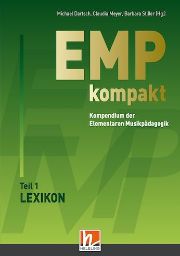Indispensable reference work
"EMP kompakt. Compendium of Elementary Music Pedagogy" by Michael Dartsch, Claudia Meyer and Barbara Stiller is both an encyclopaedia and a handbook.

"State of the art": This is the title you can use for EMP compact, compendium of elementary music pedagogy with confidence. The trio of authors takes up central and current topics in elementary music pedagogy (EMP) and deals with them in a lexicon and a handbook section. Precise, in-depth and easy to understand. And they situate EMP comprehensively in a developmental-psychological-socio-cultural context.
Here is a small selection of keywords from the lexicon (Part 1) to illustrate the immense range of issues addressed: aesthetic experience, early childhood, giftedness, digital media, group improvisation, heterogeneity, song, neuroscience, Orff, play, language and speech, practising, lesson planning. Almost 100 terms are listed and form a reference work for teachers and researchers. Let's put it to the test and look at the first word in the dictionary: "activation chain". It is defined as "the possible concatenation of principles of action" and, in the context of music education, initially refers to the formal sequence of teaching units. Such progression models can be traced back to creativity models that Graham Wallas, for example, used to describe creative processes as early as 1926. Wallas' model with the phases of preparation, incubation, illumination and verification had an impact on various specialist areas. On movement pedagogy (where one speaks of "exploration, improvisation and creation"), on the Orff Schulwerk, on elementary music pedagogy and also generally on the description of children's learning processes. The lexicon entry then discusses alternative models that add new phases or proceed in the opposite direction, always with reference to other lexicon entries (-> creativity, -> dance, -> rhythmics, -> teaching dramaturgy). The example shows how a term/topic is examined from a variety of perspectives, here from a historical as well as an artistic and teaching perspective. The bibliography at the end lists basic and recent research literature.
The handbook (Part 2) is dedicated to the didactics of elementary music education, framed by "Anthropological Dimensions" and "Psychological Backgrounds", which shed light on the human being and his developmental psychological conditions and possibilities from a music education perspective.
EMP looks back on a hundred years of development. In 1923, Fritz Jöde founded the first state music school in Berlin, and six years later the first independent conference on "Music education in kindergarten" was held. The historical review is followed by a look ahead, "Quo vadis EMP?", and discusses questions and tasks for the future. What could the EMP profession look like in the future and what training do teachers need? For example, to make "elementary" music with older people. Because, according to Michael Dartsch's thesis, "in addition to specialization options, there is also a right to offer a wide range of approaches".
The aim is to create an independent profile for EMP in the knowledge that the creative approach of EMP, which combines body, voice and instrument, can also inspire other artistic subjects. On the other hand, "EMP kompakt" aims to encourage students to question their own artistic and musical positions in order to continuously develop teaching practices and open up diverse teaching and learning opportunities. Because: "Dealing with music touches on essential aspects of human life with emotional intelligence, the development of identity, the connection to other people, the flow experience, the realization of creative impulses, autonomy and inner order. It seems legitimate and necessary to introduce children to music, because we can assume that music will open up new possibilities for them and do them good in a specific way." (Michael Dartsch)
EMP compact - indispensable for all music teachers, not only in elementary music education.
EMP kompakt. Compendium of Elementary Music Pedagogy, edited by Michael Dartsch, Claudia Meyer, Barbara Stiller, Part 1: Lexicon (655 p.), Part 2: Handbook (344 p.), Fr. 58.80, Helbling, Innsbruck et al. 2020, ISBN 9783862273904








